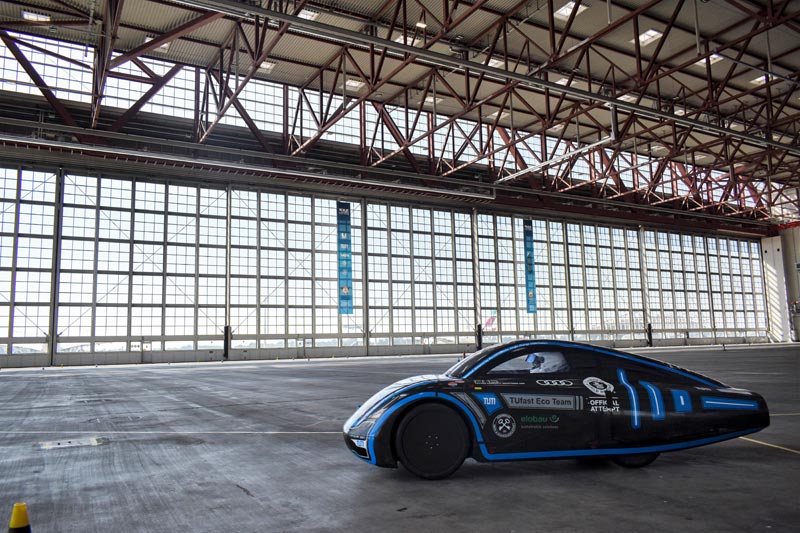
World’s Longest-Range Electric Car: 2,573 km from Munich

The competition vehicle "muc022" in pursuit of the world record.
(c) TUfast Eco
Students from the Technical University of Munich (TUM) have developed the longest range electric car in the world. The team drove more than 2.573 kilometers on a single battery charge. As part of the IAA Mobility fair, the team competed for the new world record at the Munich airport and successfully brought the title home to Munich. The test lasted an entire six days, during which the team slept on cots in an airplane hangar.
The TUfast Eco team faced a marathon and not a sprint if they were to land a new world record for TUM. It ultimately took six days before the final the results were in: The longest range electric car in the world is from Munich. In pursuit of the Guinness world record, the student initiative modified the “muc022”, which the team had already used to take part in competitions for efficient electric cars. Concentrating primarily on aerodynamic design and lightweight construction, the young engineers installed a larger battery with an output rating of 15.5 kilowatt hours to bring the vehicle up to world-record class.
Munich airport made the record run possible, providing an empty airplane hangar. The hangar meant that the team would still be able to set the world record even under poor weather conditions. The mark to beat was set by the previous recordholder at 1608.54 kilometers. The TUM team managed to cover that distance in only four days. But since the battery on board the muc022 still wasn’t empty, the team kept right on going. At the end of the trip, after 99 hours on the road the odometer showed 2.573,79 kilometers. In terms of energy, the result also means the TUfast Eco team consumed only 0,6 kilowatt hours to drive 100 kilometers. By way of comparison: Extremely economical series vehicles consume approximately 13 kWh for 100 kilometers.
Congratulations from Bavarian Minister of Science and TUM President
Bavarian Minister of Science Minister Markus Blume congratulates: “World record for TUM! Congratulations to the TUfast Eco Team on this terrific success. We are proud of the students. They make up the unique TUM spirit. And we are proud of our top university, which demands and promotes a pioneering mindset. At TUM, the motto is: study and try. The result: International engineering art made in Bavaria. With the world record, our students are not only demonstrating sporting ambition. There is more behind it: They want to shape the future of mobility in a sustainable way.”
TUM President Thomas F. Hofmann offered his congratulations for the world record: “The longest-range electric car in the world is from Munich! At TUM we support student initiatives from the widest possible variety of academic disciplines and provide space for creativity in addition to studies. I’m particularly proud of the fact that in this environment our teams perform at the highest levels again and again. This also confirms the fact that we’re doing a lot of things right in our teaching. Student groups bring additional life to campus and promote talented individuals, sometimes as early as during the Bachelor’s program. My sincere congratulations go to the TUfast Eco team for breaking this world record!”
TUfast Eco team successful in international competitions
In addition to attempts at record-breaking, the TUfast Eco team participates in international competitions such as the Shell Eco Marathon on a regular basis. Here the group puts their expertise to the test with teams from other universities in a variety of disciplines. Here among other things the possibilities of autonomous driving play a certain role. “Countless hours of work in addition to our studies went into preparing for the record. This makes us all the more happy that we now hold the world record. The muc022 had already succeeded in several competitions, and now this is the crowning achievement. Our thanks go to everyone who supported us,” said TUfast Eco team.
Student research groups and student initiatives have a long tradition at TUM. Teams like TUfast give students the opportunity to put the knowledge they acquire in their studies directly into practice and to conduct independent research. The TUM groups perform admirably in competitions and are often in the lead.
Technical data of the muc022
• Drive: A permanent-magnet synchronous motor (PMSM)
• Output: 400 watts
• Drag coefficient (cW ): 0.159
• Weight: 170 kilograms without driver
The full title of the record is: Greatest distance by electric vehicle, single charge (non-solar)
Wissenschaftliche Ansprechpartner:
Linus Simons
Teammember of TUfast Eco
l.simons@tufast.de
Weitere Informationen:
Photos for download: https://mediatum.ub.tum.de/1718820
https://www.tum.de/en/news-and-events/all-news/press-releases/details/longest-range-electric-car-in-the-world-is-from-munich














